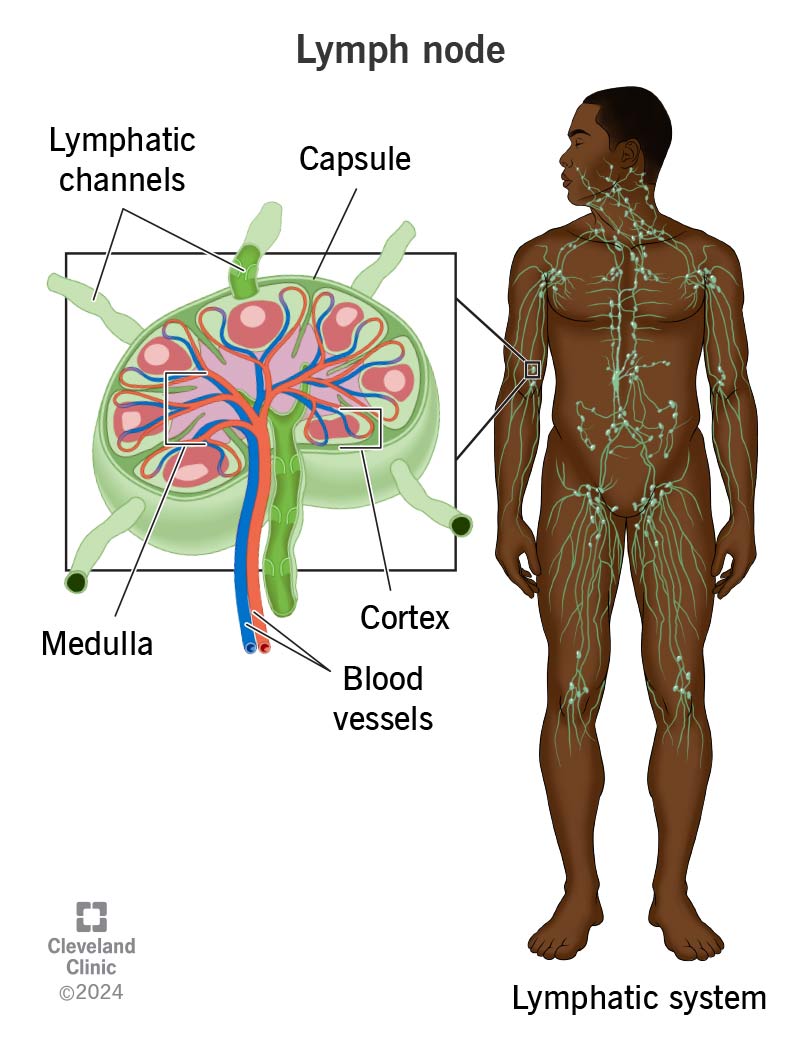
The human body is a marvel of complexity, with numerous systems working together to maintain health and function. Among these systems, the lymphatic system is often overlooked but plays a crucial role in immune defense and fluid balance. At the heart of this system are lymph nodes, small, bean-shaped structures that serve as vital hubs for immune function. In this comprehensive article, we will explore what lymph nodes are, their structure, location, and their indispensable role within the lymphatic system.
Understanding Lymph Nodes: Structure and Location
Structure:
Lymph nodes are small, round or oval structures ranging from a few millimeters to about 1-2 centimeters in size. They are distributed throughout the body, strategically placed along lymphatic vessels. Each lymph node is encapsulated in a connective tissue capsule and contains a network of trabeculae, or fibrous strands, which divide the node into compartments. These compartments house immune cells, predominantly lymphocytes, and macrophages, which are essential for filtering and responding to foreign invaders.
Within the lymph node, lymphocytes are divided into two main types: B cells, which produce antibodies, and T cells, which play various roles in cell-mediated immunity. Macrophages are responsible for phagocytizing and digesting pathogens and foreign substances.
Location:
Lymph nodes are found throughout the body, often grouped in clusters. Key locations for lymph nodes include:
- Cervical Lymph Nodes: These nodes are located in the neck and drain lymph from the head and neck region.
- Axillary Lymph Nodes: Situated in the armpits, these nodes receive lymph from the upper limbs and breast tissue.
- Inguinal Lymph Nodes: Located in the groin area, these nodes receive lymph from the lower limbs and pelvic region.
- Mesenteric Lymph Nodes: These nodes are in the abdominal area and drain lymph from the intestines.
- Superficial and Deep Lymph Nodes: There are superficial nodes, closer to the body surface, and deep nodes, located within the body’s cavities.
- Mediastinal Lymph Nodes: Found in the mediastinum (central chest area), these nodes receive lymph from the chest.
Role of Lymph Nodes in the Lymphatic System
The lymphatic system is a complex network of vessels and organs responsible for maintaining fluid balance, filtering harmful substances, and mounting immune responses. Lymph nodes are central to the lymphatic system’s function, and they serve several vital roles:
1. Filtration and Immune Surveillance:
Lymph nodes act as filtration centers for lymphatic fluid. As lymph flows through the node, it encounters immune cells, primarily lymphocytes and macrophages, which scan for pathogens, cancer cells, and foreign substances. If these are detected, the immune response is initiated.
2. Immune Response Initiation:
When lymphocytes within a lymph node encounter a foreign antigen (a molecule that triggers an immune response), they become activated. B cells produce antibodies specific to the antigen, while T cells can directly attack infected or cancerous cells. This immune response helps neutralize threats and prevent their spread.
3. Swelling and Inflammation:
When a lymph node detects an infection or other immune challenge, it may become enlarged and tender. This swelling is often a visible sign of the immune system’s active response. Enlarged lymph nodes are commonly referred to as “swollen glands.”
4. Memory and Long-Term Immunity:
Lymph nodes also play a role in the formation of immunological memory. After an immune response, some lymphocytes become memory cells. These memory cells “remember” the specific antigen and allow for a faster and more robust immune response if the same threat reappears in the future.
5. Fluid Balance:
Apart from their immune functions, lymph nodes help maintain fluid balance in the body by filtering excess tissue fluid, known as lymph, and returning it to the bloodstream. This prevents the buildup of tissue fluid, known as edema.
Conclusion
Lymph nodes are unsung heroes of the human body’s immune defense and fluid regulation systems. Their strategic placement, structural complexity, and immune cell populations make them integral to immune responses, pathogen defense, and long-term immunity. Understanding the importance of lymph nodes sheds light on the intricate workings of the lymphatic system, showcasing the remarkable capacity of the human body to defend against threats and maintain equilibrium. From their role in filtering lymph to their crucial involvement in immune responses, lymph nodes truly embody the body’s remarkable ability to protect and heal itself.



